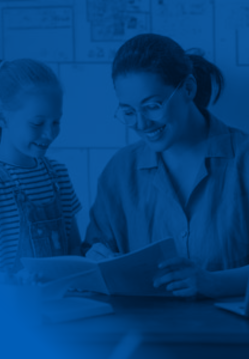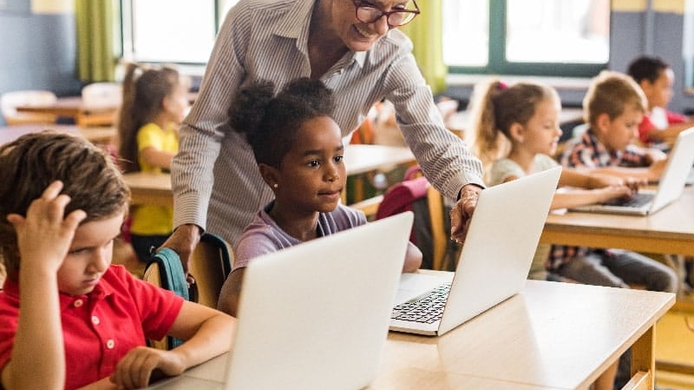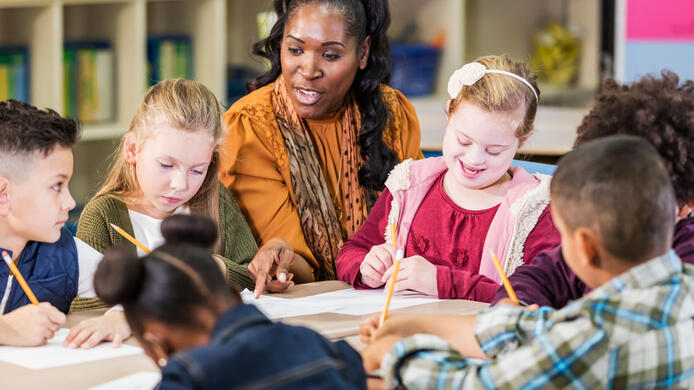Explore our resources for teaching and education degrees and learn about career options that fit your future.

Artificial Intelligence (AI) has become an integral part of our lives, transforming the way we work, communicate, and even learn. In recent years, AI-powered tools have gained significant popularity in the field of education, with ChatGPT emerging as a valuable resource for educators. ChatGPT, developed by OpenAI, is an advanced language model that utilizes natural language processing and machine learning to generate human-like responses to user prompts. This innovative tool is revolutionizing the way teachers interact with students, providing personalized support, fostering engagement, and promoting a dynamic learning environment.
Exploring the Potential of AI and ChatGPT in Education
According to a recent survey, over half of teachers have already embraced ChatGPT in their classrooms. The survey revealed that 40% of teachers use ChatGPT on a weekly basis, while 10% utilize it almost every day. However, students aren’t embracing AI at the same pace. Only 33% of students are leveraging AI for academic support, presenting educators with an opportunity to increase the adoption of AI use in school to enhance student learning. The disparity between students and teachers use of AI in education highlights the potential of ChatGPT to enhance teaching practices and transform the learning experience.
Personalized Learning Experiences
One of the key advantages of AI is its ability to provide personalized learning experiences for students. By leveraging its powerful language processing capabilities, ChatGPT can generate tailored responses to individual student queries and challenges. This instant personalized feedback enables teachers to address specific learning needs effectively and ensure that every student receives the support they require to succeed.
Enhancing Student Engagement
Engaging students in the learning process is crucial for academic success. AI serves as a valuable tool in promoting student engagement by offering dynamic interactions. With its natural language generation capabilities, ChatGPT can simulate conversations, answer questions, and provide explanations in a conversational manner. This interactive approach captures students' attention and encourages active participation, making the learning experience more enjoyable and effective.
Supporting Diverse Student Needs
Inclusive education that caters to diverse student needs is a cornerstone of effective teaching. AI can play a crucial role in supporting students with different learning styles, abilities, and preferences. By providing personalized assistance, adaptive feedback, and alternative explanations, ChatGPT ensures that every student has equal access to educational resources and opportunities for academic growth.
Practical Applications of ChatGPT in Education
The versatility of ChatGPT allows for a wide range of practical applications in the classroom. Educators can leverage the power of ChatGPT to enhance various aspects of teaching and learning, catering to the unique needs and preferences of their students.
Personalized Tutoring and Feedback
ChatGPT can serve as a virtual tutor, offering personalized assistance and feedback to students. For instance, if a teacher offers detailed feedback on a student's essay regarding run-on sentences, the student can utilize ChatGPT to improve the conciseness, thereby enhancing their writing skills for future assignments. By analyzing individual student responses and providing tailored explanations, ChatGPT acts as a reliable companion, supporting students in their learning journey.
Lesson Planning
Teachers can take advantage of the capabilities of ChatGPT to enhance their lesson planning process. With its ability to generate text and provide responses in a conversational manner, ChatGPT can serve as a valuable tool for teachers to brainstorm ideas, explore different teaching strategies, and refine their lesson objectives. By leveraging the power of ChatGPT, educators can save time and effort in their lesson planning endeavors, allowing them to focus more on delivering high-quality education to their students.
Language Learning and Practice
Language acquisition can be a complex and demanding task, requiring dedicated effort and practice. However, with the assistance of ChatGPT, the process can be made more accessible and streamlined. By engaging in conversations with ChatGPT, students are able to actively practice their language skills, vocabulary, and sentence structure, receiving valuable guidance to refine their linguistic abilities. This is particularly useful for students where English is a second language.
Research and Information Retrieval
ChatGPT can assist students in conducting research and retrieving information from reliable sources. By providing access to vast amounts of data and generating concise summaries, ChatGPT streamlines the research process and equips students with the necessary information for their projects and assignments. While not always a perfect source of evidence for research papers it can give students a place to start and research the answers provided by ChatGPT further.
Creative Writing and Storytelling
Encouraging creativity in writing is essential for nurturing students' imagination and self-expression. ChatGPT can inspire students by generating story prompts, providing writing suggestions, and engaging in collaborative storytelling exercises. ChatGPT can also help provide students with recommendations on how to take their story to the next level particularly in character or plot development.
Test and Project Preparation
ChatGPT can assist teachers by providing support in generating test questions and answers, as well as developing comprehensive rubrics for course projects. With AI, educators can save valuable time and effort, allowing them to focus on student learning and less time on actual test prep. ChatGPT test and project preparation can be incredibly useful for students as well. Students can utilize ChatGPT to review and reinforce their knowledge, ask practice questions, and receive immediate feedback.
This interactive approach to test preparation can help students identify areas of weakness and focus their studying efforts effectively. Additionally, ChatGPT can assist students in brainstorming ideas and organizing their thoughts for projects, providing valuable guidance and support throughout the entire process.
ChatGPT and the California Standards for the Teaching Profession (CSTP)
The California Standards for the Teaching Profession (CSTP) are a set of guidelines and expectations that serve as a framework for effective teaching in the state of California. These standards were developed to provide a common language and set of goals for educators to improve their teaching practices and, in turn, enhance student learning. The CSTP consists of a set of six overarching standards, each with its own subcomponents which include:
- Engaging and Supporting All Students in Learning
- Creating and Maintaining Effective Environments for Student Learning
- Understanding and Organizing Subject Matter for Student Learning
- Planning Instruction and Designing Learning Experiences for All Students
- Assessing Student Learning
- Developing as a Professional Educator
ChatGPT can support the Engaging and Supporting All Students in Learning standard by offering teachers access to diverse teaching materials and resources. It can help educators personalize their teaching approaches to meet the needs of a diverse student body. It also helps in the standard of Creating and Maintaining Effective Environments for Student Learning by providing effective classroom management strategies for various grade levels and in cases of disruptive students.
Additionally, the Understanding and Organizing Subject Matter for Student Learning standard is reinforced through ChatGPT, as it provides teachers with valuable insights to enhance their expertise and deliver more effective lessons through presentations or summaries. This also plays a role in the Planning Instruction and Designing Learning Experiences for All Students by helping teachers brainstorm interactive activities that can aid in engaged learning. This can benefit students who struggle with ADHD, learning disabilities, and more.
Furthermore, the Assessing Student Learning standard is reinforced by ChatGPT as it offers insights into different assessment methods to gain confidence in student understanding of lessons and subject matter. Finally, ChatGPT can contribute to the Developing as a Professional Educator standard by aiding in the creation of personal SMART goals, curating comprehensive lists of resources that can be shared with students and their families to support their academic progress, and facilitating self-reflection and assessment to enhance teaching methodologies.
Best Practices for Integrating ChatGPT in the Classroom
While ChatGPT offers immense potential, its integration into the classroom requires careful consideration and adherence to ethical guidelines. To effectively leverage ChatGPT in educational settings, teachers should follow a set of best practices that ensure responsible usage and maximize the tool's benefits.
Training and Familiarization
Before introducing ChatGPT in the classroom, educators should undergo training and familiarize themselves with the tool's features, capabilities, and limitations. This training equips teachers with the necessary skills to effectively navigate ChatGPT and leverage its potential for personalized learning experiences.
Ethical Considerations
Ethical considerations play a vital role in the integration of AI tools like ChatGPT in education. Educators must emphasize responsible usage, ensuring that ChatGPT is used to enhance learning and not replace human interaction. It is crucial to establish clear boundaries for ChatGPT usage, addressing issues such as privacy, data security, and the impact on social and emotional development.
Set Clear Boundaries
When incorporating AI into the classroom, it is crucial to establish explicit guidelines and expectations regarding the appropriate and inappropriate use of ChatGPT. Students should be informed that any submitted work must be their own or there will be consequences. As an educator, you can also modify assignments to focus more on critical thinking or project-based tasks, rather than solely answering basic topic-related queries.
Evaluating Accuracy and Reliability
As with any AI-powered tool, accuracy and reliability are essential factors to consider when using ChatGPT in the classroom. Educators should evaluate the responses generated by ChatGPT to ensure they align with accurate information and reliable sources. It's important to verify and cross-reference the information provided by ChatGPT to maintain the integrity of the learning experience. Students should also fact-check all information they are using for research assignments or projects.
Embrace the Use of ChatGPT in Academics with UMass Global
As AI continues to shape the future of education, tools like ChatGPT offer immense potential for transforming teaching practices and enhancing student learning experiences. By harnessing the power of natural language processing and machine learning, educators can provide personalized support, foster engagement, and create inclusive learning environments.
Explore more about this topic in UMass Global's webinar, "Teaching Smarter, Not Harder: Time-Saving ChatGPT Strategies for Educators" or learn more about how you can leverage technology tools in the classroom with our blog "Top 10 Technology Tools for the Classroom."








